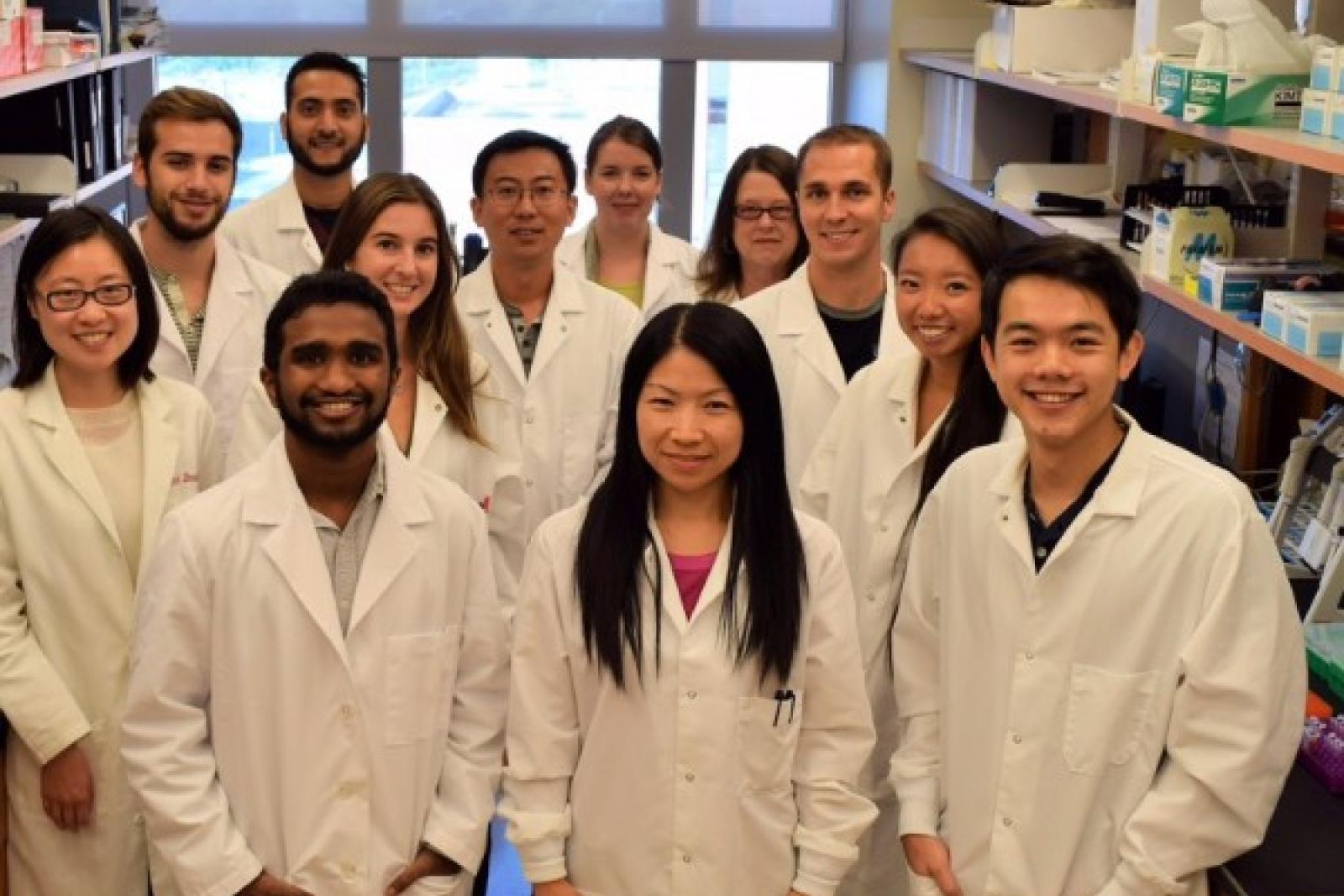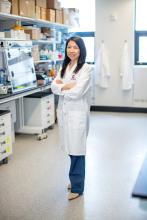Mentorship and collaboration prepare anti-cancer researchers for new journey as PI

Although her early career hasn’t led her to the industry job she anticipated after college, Shuiying Hu, PhD, finds herself doing work that she is incredibly passionate about and surrounded by people she continues to learn from and be mentored by – and that’s a great place to be.
“Every day I wake up excited about what I am going to do. The work is rewarding and exciting,” said Dr. Hu, an assistant professor, principal investigator and NIH-funded researcher at The Ohio State University College of Pharmacy. She is also a member of the Experimental Cancer Pharmacology Laboratory (ECPL), a collaboration with two other College of Pharmacy researchers, Drs. Sharyn Baker and Alex Sparreboom.
After graduating from West Virginia University with a degree in pharmaceutics with a focus on cell signaling pathways of apoptosis for her graduate studies, Dr. Hu went to John Hopkins University to work in oncology department – translating genetic findings made in the lab to the clinical diagnosis, risk prognostication of thyroid cancer and building a new skill set.
“My work at John Hopkins opened my eyes to work in oncology,” Dr. Hu said. “Although the research was translational in nature, it is not directly related with drug treatment, so I wanted to find a way to combine my pharmaceutical background in translational drug development and oncology. That’s when I joined Sharyn Baker’s lab to work in clinical pharmacology.”
Drs. Baker and Hu soon moved to St. Jude’s Children’s Research Hospital, where they started new work in developmental therapeutics for acute myeloid leukemia (AML). This opened another new field for Dr. Hu and gave her the opportunity to work on preclinical development of anti-cancer agents. She was also highly involved with Dr. Sparreboom’s lab working on transporters and the role of transporters in chemotherapy drug-induced toxicity.
“The combination therapies that we developed in the lab at St. Jude’s were translated into children’s treatment in the hospital,” Dr. Hu said.
In 2015, when members of the ECPL were offered positions at Ohio State, they decided to continue their collaboration.
“I was excited to come to Ohio State because of the resources, collaborations and clinicians we have access to here,” Dr. Hu said. “Considering the anti-cancer drugs we work with, mainly used in adult oncology, it can be hard to translate the intervention strategy into clinical settings at a smaller pediatric hospital. Ohio State and the Wexner Medical Center give much more opportunity.”
Dr. Hu said she has been impressed with the amount of resources and opportunities to collaborate across campus. When thinking about different types of researchers/expertise that the ECPL might need to work with, she said she wasn’t surprised to find the person next door or cross the street with the exact specialty needed.
Her journey to Ohio State has been guided by her mentors, Drs. Sharyn Baker and Alex Sparreboom, and Dr. Hu has seized the opportunity on many occasions to learn from her seasoned collaborators, expand her skill set and then work to combine the skills in innovative ways.
Her years of diverse experiences and training have prepared her to take on a new challenge – mentoring the next generation of anti-cancer researchers – a task Dr. Hu is incredibly passionate about.
“I’m excited to give to students some of the inspiration that I have received and have a chance to make that impact on them,” Dr. Hu said. “My experiences at Hopkins and St. Jude’s, combined with my time at Ohio State, will help my lab translate years of benchwork into clinical outcomes. Being a PI drives me to work harder because I know that students will be counting on me, and it motivates me to be the best I can. It’s a fun journey.”
Dr. Hu’s current research interests focus on the role of solute carriers, in particular OCT2 and OATP1B, in the disposition and toxicity of commonly prescribed drugs. The work she did as a trainee was the first to demonstrate the importance of transporter-mediated uptake mechanisms in the etiology of neurotoxicity associated with oxaliplatin, and provided a foundation for clinical studies to ameliorate debilitating toxicities associated with platinum chemotherapeutics.
In her independent research laboratory, her team has extended these peripheral neurotoxicity studies to paclitaxel and further explored with oxaliplatin. These initial findings were recently published and have already resulted in fruitful clinical collaborations and the design of two ongoing clinical trials.
Her work is getting noticed both with new grants and through scientific organizations at the national level. Dr. Hu recently received the American Society for Clinical Pharmacology and Therapeutics’ 2021 Darrell Abernethy Early Stage Investigator Award. This award is intended to foster growth of early career scientists and provides a $10,000 grant.
“Every aspect of my career has been impacted by mentorship. Dr. Sparreboom has inspired a lot of the work I have done and I have seen how important a mentor can be in a career,” she said. “In his humble and intelligent manner, he introduced me to the independent career. He always put me in a position to learn, to grow and provided me an opportunity to reach my potential. And for that I am extremely grateful. I continue to strive to live up to the expectation he has of me, and while I am better than I was, I am still on that journey – to become an expert in this field.”

I’m excited to give to students some of the inspiration that I have received and have a chance to make that impact on them.